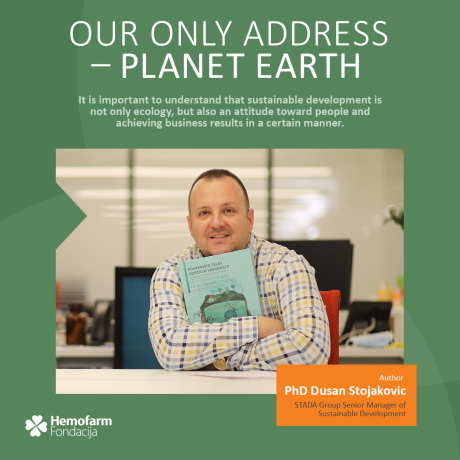
21/04/2022
Planet Earth – Our Only Address
Dr Dušan Stojaković
STADA Group Senior Manager of Sustainable Development
Planet Earth – Our Only Address
How many times a year do we think about our planet as our only address? If we were honest, the answer would be distressful. Instead of doing it every day – since healthy air, water and earth are prerequisites of a healthy life, we usually remember our planet either when our basic resources of life are endangered or on 22nd April – a day when the Earth Day is marked throughout the world.
For more than a decade, I have been professionally engaged in sustainable development and I believe that sustainable development is the only way for our planet, life on it, and ourselves to survive and keep on going with the resources we need. It is therefore important to understand that sustainable development is not only ecology, but it also involves an attitude towards people, as well as an achievement of business results in a certain manner.
The biggest truths and the most important victories are based on the model – ‘Think globally, act locally’, which invites companies and people to be responsible, to stop further pollution of the planet, and take actions in their own communities and cities. This is the piece of paper that we never throw onto the floor but always into the rubbish bin, the switched off light when we leave a room, and the tap that we turn off when we brush our teeth, because we need water only when we wash away the toothpaste. There are many examples of social responsibility.
In order for everyone’s little piece to be added up to a global victory, various methods have been conceived on how to achieve more together and make a positive impact on the planet. One of such initiatives is the UN Sustainable Development Goals – the 17 Goals. Regardless of whether we are engaged in resolving the issue of poverty, stopping hunger, fighting for good health and wellbeing, gender equality and equal chances for everyone, responsible production and consumption, sustainable cities, renewable energy sources, or preserving water and life on the Earth – it is all good as long as we are trying, regardless of the sustainable development goal we have chosen. This exactly is the point. A couple of years ago, I attended a lecture at an international conference given by a Scandinavian professor. The title of the lecture was: ‘What is Your Number’. His message was simple – every one of us should choose at least one of the 17 Sustainable Development Goals and do everything in his/her private and professional life to contribute to the achievement of that goal. Already during that lecture, I chose number 17 – ‘revitalise the global partnership for sustainable development’, and I pledged to undertake to always develop partnerships devoted to promoting sustainable development everywhere. I believe I have become recognisable by that.
Studies reveal that as many as 60% of people living in urban environments worldwide are ready to make choices and undertake actions towards making a move forward in preserving the planet and in sustainable development, while only 10% of companies globally offer such choices. The company I work for belongs to the 10% of companies. Whether it is optimised and energy-efficient production, packs made of recycled cardboard, or education in the field of health prevention, Hemofarm Company and its employees really live and work in accordance with the principles of sustainable development. This is why it comes as no surprise that we are the leaders in this field, while some side effects, such as more than 218 football fields covered by forests saved by using recycled cardboard over the past ten years, certainly represent a factor of trust in the brand and the products.
Recently, I had a chance to share my thoughts in the corporate blog on the following topic: ‘Monday Diet without Animal Meat’. The topic seems strange and unfamiliar, while in fact it illustrates the other side of the story – how much we actually don’t know about our impact on the planet. I am going to share just the gist of the story with you here. More than 30% of the Earth surface is currently used for breeding animals for human food (including the grazing land and the fields used to grow food for those animals). More than 70% of crops in the USA are grown for feeding animals. As many as 3.5 billion people could live of the food that is used for feeding farm animals. Almost 80% of the surface area of the cleared Amazon rainforests is used for grazing and producing food for feeding cattle. Production of 1 kg of animal protein requires 12 times more land, 13 times more fossil fuel, and 15 times more water in relation to the requirements for producing 1 kg of soy protein. Producing 1 kg of veal requires 15,500 l of water, while growing 1 kg of tomatoes requires 180 l, and 1 kg of wheat 1,000-2,000 litres. The United Nations warn that breeding animals for human food contributes to the emission of greenhouse gases more than all the cars and trucks in the world together. Cows and sheep emit gases that contain methane and are thus ‘responsible’ for 37% of the total quantity of total methane emissions (which effects the global warming 23 times more than carbon dioxide), owing to human activities.
Stop for a moment and think about our planet, our impact on it and a chance for every one of us to do something good. Devote yourself to the planet, but also to yourself, for at least one Monday in a month – it won’t be to no avail, either for your health or for the health of the planet. And do not forget that you are the last hope for the Planet Earth. I beg you to protect it. Otherwise, we will become history, together with all the other creatures living on it.

AUTHOR
Dr Dušan Stojaković
STADA Group Senior Manager of Sustainable Development